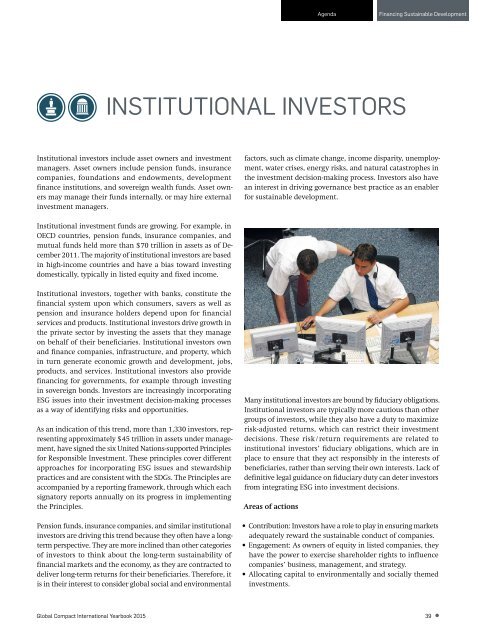Global Compact International Yearbook 2015
The Global Compact International Yearbook is with more than 400,000 readers one of the worlds leading CSR publications. In the new edition Leonardo DiCaprio speaks about business and sustainability. Declares DiCaprio: “We need to change our thinking and our sense of urgency .” Leonardo DiCaprio may be one of the world’s top movie stars, but he would rather be defined and respected more for his work as a committed environmentalist. Over the years, he has personally funded as well as helped to raise tens of millions of dollars for a variety of green-related causes. He believes that his greatest legacy will be the progress he has helped make toward safeguarding the planet against the ravages of global warming, pollution, and species protection. Other issues are: The state of CSR and 15th anniversary of the UN initiative Private Investment and Sustainable Development Voluntary Sustainability Standards Münster/New York 2015: 172 pages, paperback Publishing houses: macondo publishing/UN Publications Subscription (via UN Publications only): 30.00 USD (regular) 15.00 USD (reduced) ISBN13: 978-3-9813540-9-6 / ISSN-Print: 2365-3396 / ISSN-Internet: 2365-340x
The Global Compact International Yearbook is with more than 400,000 readers one of the worlds leading CSR publications. In the new edition Leonardo DiCaprio speaks about business and sustainability. Declares DiCaprio: “We need to change our thinking and our sense of urgency .” Leonardo DiCaprio may be one of the world’s top movie stars, but he would rather be defined and respected more for his work as a committed environmentalist. Over the years, he has personally funded as well as helped to raise tens of millions of dollars for a variety of green-related causes. He believes that his greatest legacy will be the progress he has helped make toward safeguarding the planet against the ravages of global warming, pollution, and species protection. Other issues are:
The state of CSR and 15th anniversary of the UN initiative
Private Investment and Sustainable Development
Voluntary Sustainability Standards
Münster/New York 2015: 172 pages, paperback
Publishing houses: macondo publishing/UN Publications
Subscription (via UN Publications only): 30.00 USD (regular) 15.00 USD (reduced)
ISBN13: 978-3-9813540-9-6 / ISSN-Print: 2365-3396 / ISSN-Internet: 2365-340x
- No tags were found...
Create successful ePaper yourself
Turn your PDF publications into a flip-book with our unique Google optimized e-Paper software.
Agenda<br />
Financing Sustainable Development<br />
INStitutional InvEStors<br />
Institutional investors include asset owners and investment<br />
managers. Asset owners include pension funds, insurance<br />
companies, foundations and endowments, development<br />
finance institutions, and sovereign wealth funds. Asset owners<br />
may manage their funds internally, or may hire external<br />
investment managers.<br />
factors, such as climate change, income disparity, unemployment,<br />
water crises, energy risks, and natural catastrophes in<br />
the investment decision-making process. Investors also have<br />
an interest in driving governance best practice as an enabler<br />
for sustainable development.<br />
Institutional investment funds are growing. For example, in<br />
OECD countries, pension funds, insurance companies, and<br />
mutual funds held more than $ 70 trillion in assets as of December<br />
2011. The majority of institutional investors are based<br />
in high-income countries and have a bias toward investing<br />
domestically, typically in listed equity and fixed income.<br />
Institutional investors, together with banks, constitute the<br />
financial system upon which consumers, savers as well as<br />
pension and insurance holders depend upon for financial<br />
services and products. Institutional investors drive growth in<br />
the private sector by investing the assets that they manage<br />
on behalf of their beneficiaries. Institutional investors own<br />
and finance companies, infrastructure, and property, which<br />
in turn generate economic growth and development, jobs,<br />
products, and services. Institutional investors also provide<br />
financing for governments, for example through investing<br />
in sovereign bonds. Investors are increasingly incorporating<br />
ESG issues into their investment decision-making processes<br />
as a way of identifying risks and opportunities.<br />
As an indication of this trend, more than 1,330 investors, representing<br />
approximately $ 45 trillion in assets under management,<br />
have signed the six United Nations-supported Principles<br />
for Responsible Investment. These principles cover different<br />
approaches for incorporating ESG issues and stewardship<br />
practices and are consistent with the SDGs. The Principles are<br />
accompanied by a reporting framework, through which each<br />
signatory reports annually on its progress in implementing<br />
the Principles.<br />
Pension funds, insurance companies, and similar institutional<br />
investors are driving this trend because they often have a longterm<br />
perspective. They are more inclined than other categories<br />
of investors to think about the long-term sustainability of<br />
financial markets and the economy, as they are contracted to<br />
deliver long-term returns for their beneficiaries. Therefore, it<br />
is in their interest to consider global social and environmental<br />
Many institutional investors are bound by fiduciary obligations.<br />
Institutional investors are typically more cautious than other<br />
groups of investors, while they also have a duty to maximize<br />
risk-adjusted returns, which can restrict their investment<br />
decisions. These risk / return requirements are related to<br />
institutional investors’ fiduciary obligations, which are in<br />
place to ensure that they act responsibly in the interests of<br />
beneficiaries, rather than serving their own interests. Lack of<br />
definitive legal guidance on fiduciary duty can deter investors<br />
from integrating ESG into investment decisions.<br />
Areas of actions<br />
• Contribution: Investors have a role to play in ensuring markets<br />
adequately reward the sustainable conduct of companies.<br />
• Engagement: As owners of equity in listed companies, they<br />
have the power to exercise shareholder rights to influence<br />
companies’ business, management, and strategy.<br />
• Allocating capital to environmentally and socially themed<br />
investments.<br />
<strong>Global</strong> <strong>Compact</strong> <strong>International</strong> <strong>Yearbook</strong> <strong>2015</strong> 39

















